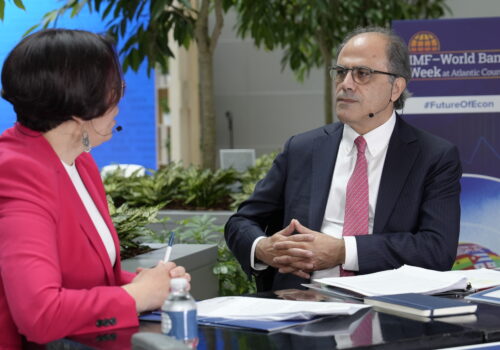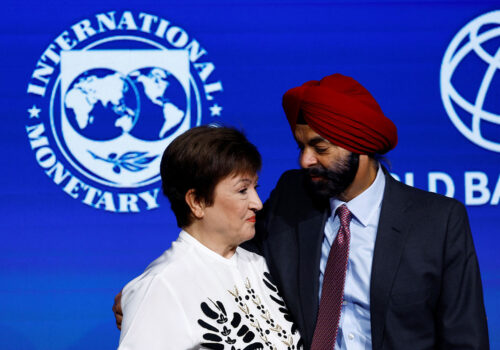MENA’s economic outlook for 2025 and beyond from the Atlantic Council’s IMF/World Bank Week
During this year’s World Bank and International Monetary Fund (IMF) Fall Meetings, the Atlantic Council’s empowerME Initiative, alongside the GeoEconomics Center, hosted a week of events that provided plentiful insights into the region’s economic outlook.
The Economic and Social Costs of the Gaza War
“We’ve had the loss of lives, injuries, and the cessation of economic activity in general in Gaza—as well as the demolition of infrastructure,” economist Perrihan al-Riffai said on Tuesday, October 22nd, during the launch of her new report, authored in partnership with the Atlantic Council’s empowerME Initiative and GeoEconomics Center.
The new report, “The economic and social costs of the Gaza War,” uses data to navigate the war’s toll, not only upon the “epicenter countries” directly involved in the conflict but also the broader Middle East. The socioeconomic cost of the war has been overwhelming—but not entirely in the ways economists, at the beginning of the war last October, initially thought.
Al-Riffai noted that the war had a negative effect on supply chains—especially vis-a-vis Houthi attacks in the Red Sea—but that the increased costs of the diversion had not translated into the expected increase in prices for consumers. Another surprise was the conflict’s apparent lack of immediate impact on oil and energy prices.
Other socioeconomic impacts, though, were predictably devastating. The war has “helped exacerbate Egypt’s already challenging foreign exchange situation and current account difficulties,” said al-Riffai. Israel faces surging inflation, debt, and military spending, with its labor market hemmed in by militarization. Moreover, “the longer the conflict goes on and the more intense it becomes,” there is potential that risk-shy investors could turn away from investment in the broader Middle East.
As for the human toll, migration and displacement have shot up. Palestinian refugees fleeing to nearby countries already facing economic challenges, like Jordan and Lebanon, may unfortunately represent “an extra pressure point on public utilities, including the social sector, health, and education. Unfortunately, what ends up happening is the refugees end up suffering in addition to the host country’s citizens.”
Reshaping Egypt’s fiscal policy with Finance Minister Ahmed Kouchouk
“We still need to keep the course of reforms and to keep monitoring things, but on the fiscal side, we’re seeing good performance,” said Egyptian Finance Minister Ahmed Kouchouk, speaking at an Atlantic Council event on Wednesday, October 23rd, discussing the future of Egypt’s fiscal policy. His Excellency discussed Egypt’s prosperous relationship with the IMF and spoke on the ongoing program which aims to address fiscal imbalances accrued during the Covid-19 pandemic, as well as public spending at large.
Discussing current challenges to the Egyptian economy, Minister Kouchouk spoke on the work that the Egyptian Central Bank is doing to bring inflation back to its 2025 target, as well as the importance of social safety programs for Egyptians impacted by rising costs – including a conditional cash transfer program developed in collaboration with the World Bank.
Minister Kouchouk also noted that Egypt has made climate and sustainability a priority in economic planning. H.E.’s participation in the Coalition of Finance Ministers for Climate Action has allowed Egypt to collaborate with other nations and adopt new strategies to meet the Sustainable Development Goals. Further, Egypt has become the first issuer of green bonds in the region. “We are streamlining climate in our work, in our planning, in the fiscal risk statement.”
Saudi Arabia’s economic outlook with Minister Faisal F. Alibrahim
“The idea of Vision 2030 was based on optimism for the future,” said H.E. Faisal F. Alibrahim, Saudi Arabian Minister of Economy and Planning on Thursday, October 24th, at the Atlantic Council. The Minister spoke on the Kingdom’s primary economic goals – namely, to diversify the economy to bring in different sources of growth and to elevate the role of private businesses. “Ultimately, the objective is for the private sector to grow. We have set an ambitious target of 65% for the private sector, and we’re moving slowly in that direction.”
As the Saudi economy moves away from oil dependency, the Minister dsicussed the investment diversification effort the Kingdom made in various industries under Saudi Vision 2030, including in technology, artificial intelligence, and tourism. The government has also made sustainability a key priority and has invested heavily in electric vehicles, hydrocarbon energy, solar energy, and carbon removal technology. The Minister stressed the government’s strong commitment to sustainability and the need for the Kingdom to take a regional leadership role on this issue: “A stronger Saudi economy is good for the region.”
“The heart of all of this is technology and innovation,” said Minister Alibrahim. “Diversification is essentially just doing what you don’t know how to do.”
Egypt’s sustainable investment and trade growth, with Minister Hassan El Khatib
“I want stable policies, I want predictable policies, and I want to make sure that this location is competitive now and for the next twenty years,” said H.E. Hassan El Khatib, Egypt’s minister of investment and foreign trade. “Egypt has a major advantage and a great opportunity today, especially with the supply chain shift, with onshoring, with our abundance of quality labor.”
On Friday, October 25th, the minister joined the Atlantic Council at the International Monetary Fund to discuss Egypt’s sustainable investment and trade growth with empowerME Initiative Director Racha Helwa. He highlighted Egypt’s empowerment of its private sector and its planned shift away from government-led economic growth: By 2030, H.E. said, the Egyptian government aims for the private sector to contribute 75 percent of investments. These efforts are part of Egypt’s commitment to building an attractive business environment, securing more foreign direct investment, and streamlining existing trade and tax policies.
For example, the minister underscored the need to make the logistics of trade simple and fast, not only by reducing non-tariff barriers but also by pursuing digitization. “Trade is about the ease of getting goods in and out,” His Excellency said. “We want to cut the time taken to release goods by 30 to 50 percent.” Egypt’s trade prospects stand out in a troubled region given the country’s excellent strategic location, clear policies, renewable energy resources, abundant high-quality labor, and stable approach to regional challenges.
Kate Springs and Leila Ouhri are Young Global Professionals in the Atlantic Council’s Middle East Programs.

empowerME
empowerME at the Atlantic Council’s Rafik Hariri Center for the Middle East is shaping solutions to empower entrepreneurs, women, and youth and building coalitions of public and private partnerships to drive regional economic integration, prosperity, and job creation.
Further reading
Tue, Apr 30, 2024
MENA’s economic outlook from the Atlantic Council’s IMF/World Bank Week
Event Recap By
Highlights from empowerME's week of events during this year's World Bank and International Monetary Fund Spring meetings.
Tue, Oct 22, 2024
The economic and social costs of the war in Gaza
Report By Perrihan Al-Riffai
After a year of war, Israel, the Palestinian territories, and neighboring countries need a permanent ceasefire. But with development gains erased, billions of dollars in infrastructure damaged, and skyrocketing unemployment, the Middle East also urgently needs a solid reconstruction plan.
Mon, Oct 21, 2024
Get an inside look at the IMF-World Bank meetings as finance leaders navigate a geopolitically fragmented world
Bretton Woods 2.0 By
To gauge whether delegates can revive the world's spirit of cooperation at the IMF-World Bank Annual Meetings, we sent our experts to the center of the action in Foggy Bottom.


